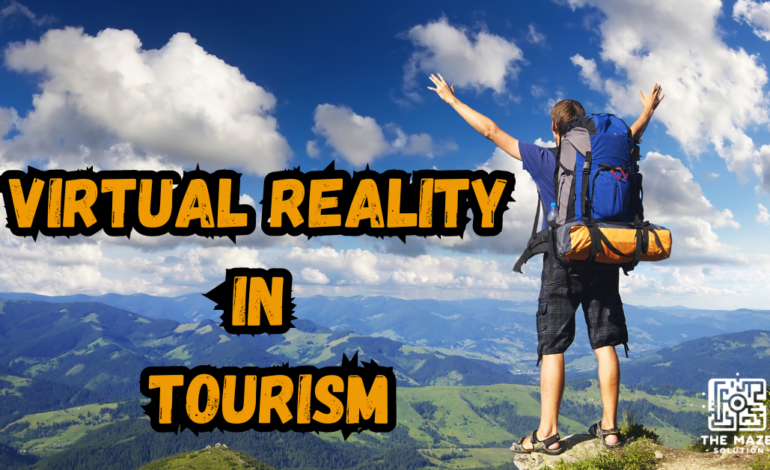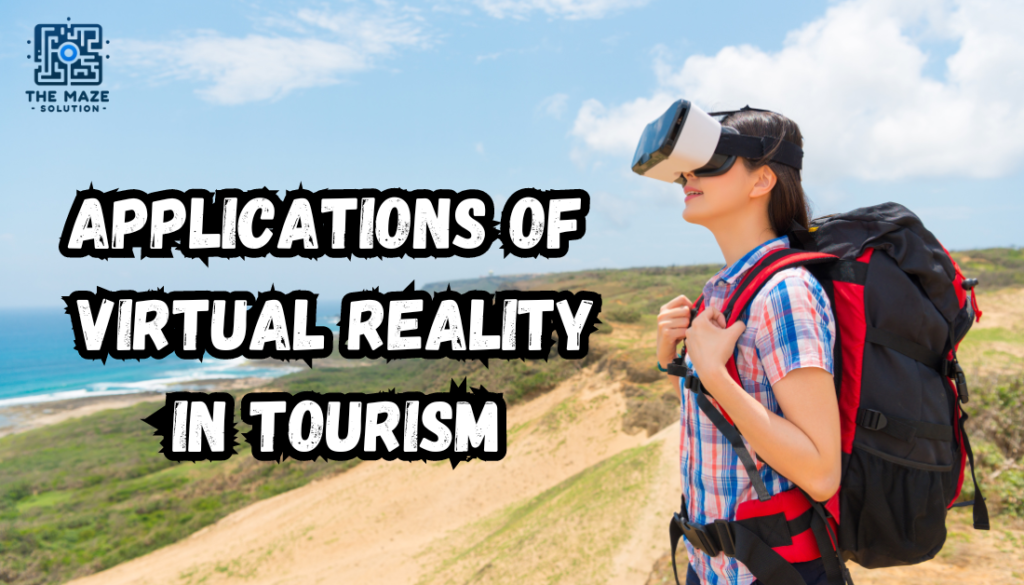Virtual Reality in Tourism: Enhancing Visitor Experience and Industry Growth

In recent years, virtual reality (VR) has made significant strides across many industries, including tourism. This innovative technology is reshaping how we explore the world, offering unprecedented ways to experience new places and cultures without leaving home. For travel enthusiasts, tourism professionals, and tech-savvy consumers, Virtual Reality in tourism presents a multitude of opportunities to enhance visitor experiences and stimulate industry growth. In this blog post, we’ll explore the applications, benefits, and future prospects of VR in tourism, providing valuable insights and practical tips for those interested in this exciting intersection of technology and travel.
Introduction to Virtual Reality in Tourism
Virtual Reality in tourism isn’t just a futuristic concept seen in science fiction. It’s here now, transforming industries from gaming to education—and notably, tourism. VR allows users to immerse themselves in computer-generated environments, providing a sense of presence in a place they might otherwise only dream of visiting. For the tourism industry, this means offering potential travelers a taste of destinations before they physically arrive, making it a powerful tool for both enhancing experiences and driving economic growth.
Why VR in Tourism Matters
The potential of VR in tourism is vast. Imagine being able to walk through the bustling streets of Tokyo or explore the ancient ruins of Athens without booking a flight. VR brings destinations to life, bridging the gap between imagination and reality. Not only does this technology offer immersive cultural experiences, but it also plays a crucial role in decision-making for travelers planning their next adventure. By providing a virtual preview, VR helps travelers make informed choices, ultimately enhancing their overall experience and satisfaction.
Applications of VR in Tourism
Virtual Tours of Destinations
VR technology enables tourists to explore destinations remotely through virtual tours. This application allows potential visitors to virtually stroll through iconic landmarks like the Eiffel Tower or wander the corridors of the Louvre. These virtual tours offer a glimpse of what travelers can expect, providing a unique perspective that static images or videos simply cannot capture. Popular attractions around the world are increasingly adopting VR to give potential visitors an idea of what awaits them.

Virtual Reality in Cultural and Historical Exploration
One of the most captivating uses of VR in tourism is its ability to recreate historical events and cultural sites. With VR, users can virtually step back in time to witness historical events unfold or explore cultural landmarks long gone. Museums and cultural institutions are leveraging VR to offer educational experiences that transport visitors to different eras and places, allowing them to learn about history in an engaging and immersive way.
Pre-Visit Experiences and Trip Planning
VR is revolutionizing the way travelers plan their trips. By offering virtual previews of hotels, attractions, and transportation options, VR helps travelers make more informed decisions. This not only enhances the planning process but also reduces the uncertainty associated with traveling to unfamiliar destinations. Travelers can now explore accommodations, check out local attractions, and plan their itinerary with confidence, all from the comfort of their home.
Virtual Reality in Adventure and Extreme Tourism
For thrill-seekers and adventure enthusiasts, VR provides a safe and exciting way to experience extreme tourism activities. Whether it’s skydiving over the Grand Canyon or climbing Mount Everest, VR offers a risk-free opportunity to engage in high-adrenaline adventures. This not only appeals to those who may be hesitant to try these activities in real life but also allows individuals with physical limitations to experience the thrill of adventure from a new perspective.
Benefits of VR in Tourism
Enhanced Visitor Experience
VR technology takes visitor experience to a whole new level by providing immersive and interactive experiences. Travelers can explore destinations in a way that stimulates their senses, making them feel as though they are truly there. The psychological benefits of experiencing a destination virtually before physically visiting include reduced travel anxiety and increased excitement, ultimately enhancing the overall travel experience.
Accessibility and Inclusivity
VR is breaking down barriers to travel, making tourism more accessible for individuals with disabilities or those unable to travel physically. By offering virtual experiences, VR allows everyone to explore the world, regardless of their physical limitations. This inclusivity fosters a sense of belonging and empowerment, ensuring that everyone has the opportunity to enjoy the wonders of travel.
Sustainable and Eco-Friendly Tourism
With growing concerns about climate change and over-tourism, VR offers a sustainable solution by reducing the need for physical travel. By providing virtual alternatives, VR helps lower the carbon footprint associated with traditional tourism. Additionally, virtual tourism can alleviate overcrowding in popular destinations, preserving these sites for future generations to enjoy.
Economic Growth and Opportunities
The economic benefits of VR in tourism are significant. Virtual experiences open new revenue streams for the industry, offering unique opportunities for businesses to engage with customers. VR also creates new job opportunities, from content creation to technology development, stimulating growth within the tourism sector and beyond.
Impact of VR in Tourism
Shaping the Future of Tourism
The long-term impact of VR in tourism on the tourism industry is profound. As more individuals experience destinations virtually, travel behavior and preferences are likely to evolve. VR is set to influence future trends in tourism, with travelers increasingly seeking unique and immersive experiences. This shift will shape the way the industry operates, impacting everything from marketing strategies to destination management.
Impact on Travel Agencies and Tour Operators
The integration of VR in tourism is changing the role of travel agencies and tour operators. By offering virtual travel packages, these businesses can provide customers with a taste of their services before booking. This not only enhances customer satisfaction but also offers a competitive advantage in an increasingly digital landscape. Travel agencies that adapt to this technology are likely to thrive in the evolving tourism market.
Consumer Behavior and Expectations
VR in tourism is influencing consumer expectations, prompting travelers to seek more personalized and interactive experiences. This shift in consumer behavior is driving innovation within the industry, as businesses strive to meet these evolving demands. Additionally, VR is impacting marketing strategies, with brands leveraging immersive content to engage potential travelers and showcase their offerings.
Challenges and Ethical Considerations
While VR offers numerous benefits, it also poses challenges and ethical considerations. Job displacement, the digital divide, and potential commodification of culture are concerns that must be addressed as VR technology continues to evolve. Industry stakeholders must work collaboratively to ensure VR is used ethically and responsibly, preserving the authenticity of cultural experiences and ensuring equitable access for all.
Case Studies: Successful Implementations of VR in Tourism
Destination Marketing with VR
Many destinations have successfully harnessed the power of VR to attract visitors. For example, cities like Dubai and New York have implemented virtual tours to showcase their attractions and entice travelers. These campaigns highlight the effectiveness of VR as a marketing tool, offering potential visitors a glimpse of the experiences that await them.
Virtual Reality in Theme Parks and Attractions
Theme parks and attractions have embraced VR to enhance visitor experiences. From VR-based rides to immersive attractions, these innovations have captured the attention of thrill-seekers worldwide. The introduction of VR in theme parks has not only increased attendance but also provided unforgettable experiences that visitors rave about long after their visit.
Virtual Reality in Hospitality
Hotels and resorts are using VR to showcase their properties, offering potential guests virtual room tours and immersive previews of their amenities. This technology allows travelers to make informed decisions when booking accommodations, ultimately enhancing their overall travel experience. By providing a virtual taste of what guests can expect, hospitality businesses can entice potential customers and gain a competitive edge.
Future Prospects and Innovations in VR for Tourism
Advancements in VR Technology
The future of VR in tourism is promising, with ongoing advancements in technology set to further revolutionize the industry. Innovations such as haptic feedback and improved graphics will enhance the realism of virtual experiences, making them even more engaging and immersive. These advancements will open new possibilities for VR applications, expanding the boundaries of what is possible in virtual tourism.
Integration with Augmented Reality (AR)
The combination of VR in tourism and augmented reality (AR) holds immense potential for enhancing travel experiences. By overlaying digital information onto the real world, AR can provide travelers with additional context and insights. This integration will offer a more interactive and informative travel experience, enriching the way we explore and engage with destinations.
The Role of Artificial Intelligence (AI) in VR Tourism
Artificial intelligence (AI) is playing a crucial role in advancing VR tourism. By offering personalized and intelligent virtual travel experiences, AI enhances the relevancy and engagement of VR content. From customized recommendations to interactive storytelling, AI is transforming the way travelers interact with virtual environments, making each experience more tailored and memorable.
Conclusion
Virtual reality is reshaping the VR in tourism industry, offering unparalleled opportunities to enhance visitor experiences and drive industry growth. From virtual tours and cultural exploration to sustainable tourism and economic benefits, the potential of VR is vast. As technology continues to evolve, the integration of VR in tourism will only become more prominent, shaping the future of travel.
For travel enthusiasts, tourism professionals, and tech-savvy consumers, exploring the possibilities of VR in tourism is an exciting endeavor. By staying informed and open to innovation, we can unlock new dimensions of travel and create memorable experiences that transcend traditional boundaries.





